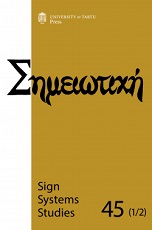A. J. Greimas’ historical lexicology (1945–1958) and the place of the lexeme in his work
A. J. Greimas’ historical lexicology (1945–1958) and the place of the lexeme in his work
Author(s): Thomas F. BrodenSubject(s): Language studies, Cultural history, Semiotics / Semiology, Epistemology, Recent History (1900 till today), Lexis
Published by: Tartu Ülikooli Kirjastus
Keywords: history of semiotics; lexicography; linguistic fields; cultural studies;
Summary/Abstract: In his first research project, Greimas developed and applied new methods in the historical lexicology of modern French. His theoretical articles formulate a sociological approach that analyses vocabulary as a history of culture, illustrated in his two dissertations on fashion in 1830. In the 1980s, from the perspective of his semiotics, Greimas dismissed his early scholarship as failed experiments that taught him what not to do. In the changed epistemological context of the 21st century, the work appears as pioneering research in cultural studies which possesses clear scholarly value. Greimas’ philological and lexicological training bore fruit directly and indirectly throughout his career. Two decades before he launched his semiotics, his project for lexicology proposes a semantic methodology, envisions the construction of an organon for the human sciences, and explicitly calls for a multi-generational collaborative enterprise. Like his structural semantics and semiotics, this lexicology entails three inseparable components: epistemological foundations, concrete methodologies, and robust applications. Moreover, a focus on the lexeme characterizes Greimas’ structural semantics and persists in his semiotics.
Journal: Σημειωτκή - Sign Systems Studies
- Issue Year: 45/2017
- Issue No: 1-2
- Page Range: 104-119
- Page Count: 16
- Language: English

